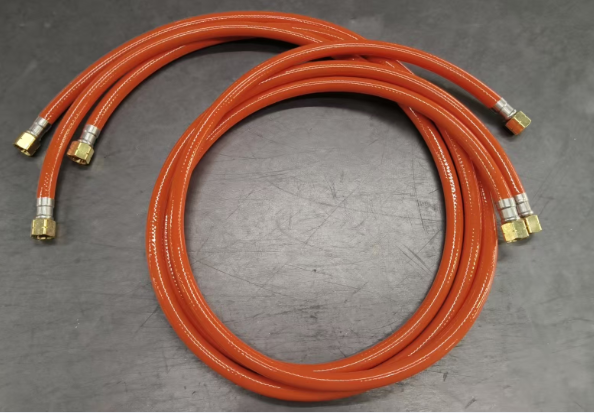Types of Air Hoses
Types of Air Hoses
Hydraulic and pneumatic systems are commonly used in manufacturing for different purposes. Air hoses are a critical component of pneumatic systems. These hoses have numerous applications across various fields in modern industry. The types of air hoses may vary depending on the application and pneumatic system.
We are all familiar with air compressors—the typical devices used in auto repair shops to compress and store air. If you observe these machines, you’ll notice rubber hoses typically transporting compressed air. Similar applications can be seen in other industries. For example, in manufacturing, pneumatic systems are used in assembly processes to grip, position, and even move components.
It’s clear that different types of air hoses are essential in manufacturing, construction, automotive, and other fields. Their versatility and widespread use make them an important topic of discussion. Many customers struggle to choose the right type of air hose, so understanding their fundamentals is necessary.
To address this, we’ve prepared a comprehensive guide on the different types of air hoses. We’ll discuss their unique features and applications, as well as the fittings and connectors used during installation. Finally, we’ll explore how to select the right air hose for your project. Let’s begin.

What Is an Air Hose?
An air hose is a flexible tube, similar to a hydraulic hose, but specifically designed to transport compressed air from a compressor to pneumatic tools. They are typically made of rubber, PVC, or reinforced metal materials. Air hoses come in various lengths and diameters, depending on their intended applications. They are widely used in manufacturing, construction, and vehicle maintenance.
When comparing hydraulic hoses and air hoses, key differences lie in the transported medium, pressure levels, and construction materials. However, both are essential for different applications. Refer to the table below for a comparison:
|
Criteria |
Air Hose |
|
|
Fluid Transported |
Compressed air |
Hydraulic fluid (primarily oil) |
|
Pressure Level |
Lower (around 300–500 PSI) |
Higher (up to 5000 PSI) |
|
Material |
Rubber, PVC, reinforced metal |
Rubber, thermoplastics, or metal |
|
Flexibility |
Generally more flexible |
Can be rigid or flexible |
|
Temperature Range |
Broad (depends on material) |
Broad (varies by type and application) |
|
Applications |
Pneumatic tools, air compressors |
Hydraulic machinery, lifts, heavy equipment |
Types of Air Hoses
As mentioned, different types of air hoses exist based on purpose, construction, pressure, temperature, and application. Typically, four main types are used in pneumatic systems:
Type 1: Standard Air Hose
These are general-purpose pneumatic tubes commonly found in everyday use. Made from rubber, PVC, or hybrid materials, they offer moderate flexibility and are used to deliver compressed air to various tools.
Example: The Multipurpose 300 PSI Rentone Hose is made from a blend of natural and synthetic rubber (SBR). It operates within a temperature range of -20°C to +70°C (-4°F to +158°F) and handles pressures up to 300 PSI. These hoses are durable, cost-effective, and suitable for tasks like inflation and pneumatic tool operation.
Type 2: Retractable Air Hose
Retractable air hoses automatically coil back into a compact form after use, often mounted on reels for easy storage. They are ideal for garages and workshops where space is limited. Typically made of rubber or PVC, they are not suited for high-pressure or high-temperature applications but remain durable for moderate conditions.
Type 3: High-Pressure Air Hose
These are reinforced with additional material layers to enhance strength, durability, and pressure resistance.
Example: The Rentone Hose IH-ARW series features multiple synthetic rubber reinforcement layers, handling pressures from 300 to 1200 PSI and temperatures from -40°C to +70°C (-40°F to +158°F). Another model, the IH-JA series (jackhammer air hose), supports up to 300 PSI working pressure (900 PSI burst pressure).
These hoses are highly flexible, abrasion-resistant, and suitable for mining, construction, shipyards, and agriculture.
Type 4: Heat-Resistant Air Hose
Designed for high-temperature environments (e.g., foundries, steel mills), these hoses are made from EPDM, silicone, or specialized materials with excellent thermal stability. Their construction may include heat-reflective or insulated outer layers to prevent deformation and cracking.
How to Choose the Right Air Hose
Selecting the correct air hose involves considering several factors:
1. Intended Application – Assess environmental conditions (temperature extremes, outdoor use, storage needs).
2. Pressure Rating – Ensure the hose can handle the system’s maximum pressure.
3. Temperature Range – Choose heat-resistant hoses for high-temperature environments.
4. Length – Measure the distance between the pneumatic system and the application point.
5. Diameter – Select based on airflow requirements for optimal performance.
Conclusion
In this guide, we’ve covered the four main types of air hoses: standard, retractable, high-pressure, and heat-resistant. While high-pressure and heat-resistant hoses often fall under reinforced categories, each type serves distinct purposes.
When selecting a hose, prioritize the application environment, pressure and temperature ratings, length, and diameter. This knowledge will help you make an informed decision for your project.

 简体中文
简体中文 English
English